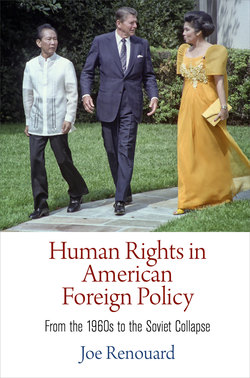Human Rights in American Foreign Policy

Реклама. ООО «ЛитРес», ИНН: 7719571260.
Оглавление
Joe Renouard. Human Rights in American Foreign Policy
Отрывок из книги
Human Rights in American Foreign Policy
Bert B. Lockwood, Jr., Series Editor
.....
It would be impossible to understand the emergence of human rights in American foreign relations without understanding the policies of President Richard Nixon (1969–1974) and his closest adviser, Henry Kissinger. The two men are remembered for several international accomplishments, including détente with the Soviets, rapprochement with China, and extrication of the United States from Vietnam. Their human rights record, though, is not held in such high regard. Nixon famously eschewed moralism, choosing instead a more traditional realpolitik quest for peace, stability, and an international balance of power. Yet Nixon and Kissinger played a central, though unintended, role in the era’s human rights politics. First, their pursuit of better relations with the Soviet Union facilitated American influence in the internal affairs of the Eastern Bloc. The Cold War thaw encouraged congressional and NGO interest in human rights causes, and it increased the potential for action against communist, anticommunist, and nonaligned states. Second, Nixon and Kissinger’s obstinacy in the face of the growing movement only galvanized their political opponents to work harder. Kissinger, in particular, was a foil for both liberal human rights activists and conservative anticommunists. A third Nixon influence was his attempt to bring white, working-class “ethnics” into the Republican fold. Owing to the period’s shifting voting patterns, these ethnics became a valuable commodity in presidential and congressional elections. Politicians were willing to give extraordinary attention to ethnics’ interests, including human rights in their ancestral homelands.
Despite his administration’s disdain for what he considered moralistic interference in presidential diplomacy, Nixon did show some signs of flexibility. He saw a place for humanitarianism in foreign affairs, but only if these issues did not conflict with his central foreign policy goals. He supported ratification of the Genocide Convention, backed relief efforts in war-torn Biafra and Burundi, and supported the idea of a U.N. human rights commissioner and a State Department humanitarian bureau. But a nominal response to natural and manmade disasters was not the same as having an active human rights policy. Nixon wanted to leave these matters to the United Nations, the State Department, and humanitarian agencies while the White House and NSC handled important bilateral issues among powerful nations.
.....